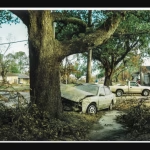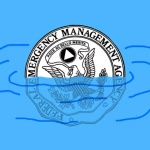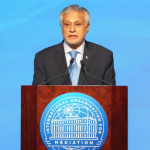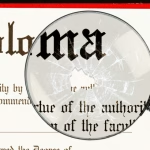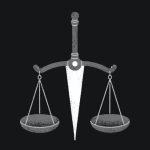The approximately 14,000 Continental Army soldiers besieging the British army in Boston in August 1775 were not doing anything especially noteworthy. In fact, for the next six months, nothing very noteworthy occurred. The British then abruptly left Boston in March 1776. For this reason, the months of seeming calm merit careful examination.
The reenactment of the Green Mountain Boys’ storming of Fort Ticonderoga by Ethan Allen was a huge success, and the anniversaries of the battles of Lexington, Concord, and Bunker Hill are over. The semiquincentennial of American independence has begun. There will undoubtedly be more significant events leading up to the July 4, 2026, celebration. Since that is the American way, one hopes and expects there will be a lot of hoopla.
However, the actual and unimpressive task of American independence was underway 250 years ago today. George Washington was greeted cautiously and without much fanfare by the Continental Army, which had been established in June 1775. An army composed primarily of New Englanders, including both dissenting freethinkers and psalm-singing, Bible-quoting descendants of the Puritans, was to be led by a slaveholding Virginia gentleman and a loosely religious Anglican.
Washington, for his part, was horrified by what he saw: free Black men with guns, money-grubbing Yankees (as opposed to land-grubbing Virginia gentry), militia units that elected their own officers and addressed them by their first names, and general squalor. “They are incredibly filthy and vile people,” he said to his cousin Lund Washington.
The events that transpired outside Boston that summer were extremely significant. Washington would need to be the first American general and not merely a provincial if this was to be an American army rather than merely a conglomeration of colonial militias. In order to maintain a force against a formidable foe, he would need to organize chaos into a system.
Despite being outnumbered and confined in Boston, which was only connected to the mainland by the narrowest of peninsulas, the British army was professional, strong, and ready to exact revenge for its unexpected losses and Pyrrhic triumphs.
Washington carried out the task in a number of ways, including dividing the army into brigades and divisions, inspecting the soldiers, enforcing discipline, emphasizing the value of digging latrines, and isolating smallpox patients. It helped that he had the appearance of a military leader: tall, elegant, well-groomed, and, by most accounts, the best horseman in the colonies. More importantly, he overcame his dislike of those odd New Englanders.
Two men who were completely different from his Virginia social circle soon became his most trusted subordinates: Henry Knox, a tubby Boston bookstore owner who became the chief of artillery, and Nathanael Greene of Rhode Island, a Quaker with a knack for organization.
After a while, the former was appointed army quartermaster and later commander of the army in the South, where he demonstrated a talent for field leadership. Before making the artillery arm on par with its British rival, the latter delivered 59 heavy-artillery pieces from Crown Point and Fort Ticonderoga to the army outside of Boston during the dead of winter.
A third New Englander, the Connecticut merchant Benedict Arnold, who was the best field commander on both sides of the war until he committed treason, was soon identified by Washington as his most gifted military leader. Washington dispatched him on a bold expedition through the wilderness of Maine in the fall of 1775, which almost resulted in the liberation of Quebec from British rule.
In March 1776, the army established a unit called the life guard because the commander in chief required a headquarters guard, or what we now refer to as a personal security detail. The life guard’s membership was skewed toward New Englanders because Washington chose men from each army unit; as its first commander, he appointed Caleb Gibbs, a Massachusetts native, who served until 1780.
Not all of the people he appointed to important posts were gentlemen; Daniel Morgan of Virginia, for instance, was a roughneck who led a corps of elite riflemen. The message was unmistakable: This was an American army, and skilled men from any background could gain the respect of their commander and advance in the ranks.
Because of his greater austerity and reserve, Washington is still, in some respects, the most distant of America’s national heroes; he is farther away from us than Abraham Lincoln. He controlled his fiery temper, handled superiors and subordinates wisely, and understood the importance of maintaining a certain distance and dignity when giving orders.
His boldness and lack of tactical leadership skills, as well as his propensity for creating complex and excessively aggressive plans, were less significant than the more significant leadership traits he had brought to Boston. It’s no surprise that he hired men who were his intellectual superiors—Thomas Jefferson, Alexander Hamilton, and John Adams—many years later. His narrative demonstrates why a leader’s moral fiber and sound judgment are far more significant than their IQ.
Washington is not as valued by Americans as he once was, despite excellent writing about him appearing in recent books, such as the first two volumes of Rick Atkinson’s trilogy on the history of the Revolution and Ron Chernow’s 2010 biography. All political parties are to blame.
Some people believe that slavery is the primary sin that permeates all facets of biography (consider the 1619 Project). As of 1775, Washington had no qualms about the fact that he frequently mistreated the several hundred slaves under his control on his Mount Vernon estate.
Part of his identity was that of a plantation owner, but it was not all of it. More significant, he manumitted all of his slaves in his will because, like some of the other Founders, he found it difficult to reconcile the principles of the Revolution with the custom of treating men and women as property.
On a deeper level, this interpretation of American history is unable to contain pride in what is still, in hindsight, a remarkable accomplishment. A new political order founded on liberty and self-government, rather than despotism, was the result of the Revolution. It was founded on principles that, as another slaveholder, Jefferson, articulated so eloquently, ultimately destroyed the corrupt system that supported their way of life.
The current administration suffers from a different kind of unrelenting present-mindedness, as it works to remove all mentions of the darker aspects of American history, starting with slavery but also encompassing the killing and eviction of American Indians and subsequent discrimination and persecution.
The Trump administration uses pabulum and kitsch, a distorted and one-dimensional portrayal of the American past, in everything from artwork to signs.
Although there are some excellent academic historians working today, such as Gordon Wood and David Hackett Fischer, the general trend is to avoid great people in favor of studying subaltern history. A commanding general has little place in a pantheon made up of individuals who were disregarded by earlier generations.
George Washington’s efforts had an impact on Cambridge and the other towns around Boston that summer and fall. It serves as a reminder that while dramatic actions were undoubtedly important in securing American independence, so were the gradual and agonizing mastery of the less dramatic things, like enforcing rank insignia and saluting, controlling the production of gunpowder, and properly excavating latrines.
It serves as a reminder that individual greatness does exist and can have a significant impact. And we would do well to remember how Washington’s lifelong battles with himself—his biases, his emotions, his upbringing, and his background—contributed to his eventual victory, especially in an era of self-righteous scorn. The example is still useful to us.

